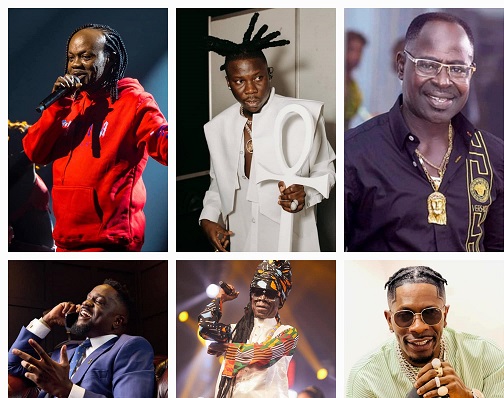GHANAIAN music is more than just melody and rhythm—it’s a vibrant tapestry, boldly woven with threads of tradition, innovation, and an unmistakable resilience that refuses to be silenced.
Every beat tells a story, every lyric echoes a legacy. And at the very heart of this ever-evolving soundscape stand six monumental figures whose influence cuts across generations, genres, and borders.
These aren’t just musicians; they are cultural institutions. They’ve crafted anthems that soundtrack weddings and protests alike, verses that live rent-free in our heads, and legacies that will long outlive auto-tune and algorithm-fueled hits.
From the honeyed harmonies of Highlife to the gritty pulse of Rap and the rebellious fire of Dancehall, these six artistes have built bridges between Ghana’s musical past and its global future.
Let’s take a front-row seat as we spotlight The Big Six—a lineup so iconic, you’d think they were cast by destiny itself: Kojo Antwi, Daddy Lumba, Amakye Dede, Sarkodie, Shatta Wale, and Stonebwoy.
Together, they are not just stars—they are constellations, guiding the next generation through the ever-changing night sky of Ghanaian music. Whether they’re crooning love songs, spitting fire, or igniting stages from Accra to Amsterdam, these six remain the pulse of a nation’s soundtrack.
Welcome to the pantheon. Welcome to The Big Six.
Kojo Antwi – The Maestro
Kojo Antwi, affectionately known as Mr. Music Man, has been a cornerstone of Ghanaian music for over four decades. His timeless hits like Odo Maayea and Akuaba continue to resonate with audiences, blending traditional rhythms with contemporary flair. Antwi's contributions to the music industry have earned him multiple Ghana Music Awards, solidifying his status as a national treasure.
Daddy Lumba – The King of Ghanaian Music
Daddy Lumba (DL), born Charles Kwadwo Fosu, is a prolific musician with over 34 albums to his name.
His songs, including Aben Wo Ha and Anidasoɔ Wɔhɔ Ma Obiara, have become anthems in Ghanaian households. Lumba's influence extends beyond music; his philanthropic efforts and cultural impact have earned him numerous accolades, including the Icon/Legend of Entertainment award at the 2018 EMY Africa Awards.
Amakye Dede – The Iron Boy of Highlife
Daniel Amakye Dede, known as "Iron Boy," has been a formidable force in the Highlife genre since the 1970s.
With over 20 albums and a repertoire of classic hits like "Jealousy Go Shame" and "Akwadaa Wesoa," Dede's music continues to inspire new generations.
In 2024, he was honoured with a Lifetime Achievement Award at the 25th Telecel Ghana Music Awards, celebrating his five decades of musical excellence.
Sarkodie – The Rap King of Africa
If rap were a kingdom, Sarkodie would be seated comfortably on a golden throne—pen in one hand, mic in the other, with bars sharp enough to slice through cynicism. He bulldozed his way in with lyrical dexterity, business savvy, and an accent that unapologetically says, “Yes, I rap in Twi. Google it.”
With a trophy cabinet that’s starting to look like a small museum—over 110 awards, including a jaw-dropping 28 Vodafone Ghana Music Awards, a BET Award for Best International Flow in 2019, and countless plaques from every corner of the continent—Sarkodie is more than a rapper. He’s a movement in sneakers.
What makes him magnetic isn’t just his technical brilliance—it’s his ability to switch between English and Twi with surgical precision, weaving social commentary, street wisdom, and motivational mantras into three-minute masterpieces.
Whether he's giving hope to the hustler on the corner or schooling global audiences on the richness of African expression, Sarkodie is both griot and gladiator.
He’s collaborated with the likes of Akon, E-40, Efya, and Runtown, and yet, despite his international acclaim, he remains unmistakably Ghanaian—an artist who made local cool and cultural authenticity lucrative.
Simply put: Sarkodie didn’t just put Ghana on the Hip-Hop map. He drew the map, labeled the streets, and handed out lyrical passports. Long may the king reign.
Shatta Wale – The Dancehall Dynamo
If controversy were a currency, Shatta Wale would be a billionaire. But strip away the social media storms and headline-grabbing drama, and what you’ll find is a musical powerhouse whose impact on Ghanaian Dancehall is nothing short of revolutionary.
Born Charles Nii Armah Mensah Jr., Shatta didn’t just enter the music scene—he detonated into it. With a catalogue bursting with anthems like “Ayoo,” “On God,” and “My Level,” he's not just setting the charts on fire—he’s torching the rulebook while he’s at it.
His sound is infectious, his presence impossible to ignore, and his fanbase—affectionately known as the Shatta Movement—is one of the most loyal (and loud) in Africa.
With over 81 awards to his name, Shatta isn’t just collecting accolades—he’s collecting proof that his rebellious, relentless brand of artistry works.
Whether he’s collaborating with international artists like Beyoncé (yes, Queen Bey) or dropping back-to-back street hits, Shatta Wale remains a force you can’t predict, ignore, or outshine.
Stonebwoy – The Global Reggae Ambassador
When Stonebwoy steps on a track, you don’t just hear the beat—you feel the Bhim. This lyrical lion has carved out a throne in the Afro-Dancehall and reggae realms with a mic in one hand and Mother Africa in his heart.
With over 40 awards tucked under his dreadlocked crown—including the prestigious BET Award for Best International Act in 2015—Stonebwoy has proven that you don’t need to water down your roots to go global. From Ashaiman to Amsterdam, his sound has been a passport stamped with grit, grace, and gut-punching grooves.
Stonebwoy doesn’t just move crowds—he moves continents.And wherever the global sound is going, trust that he’s already two riddims ahead.
End Thoughts
Ghanaian music is a legacy built across eras—from legends like E.T. Mensah, Nana Ampadu, and Osibisa, to the powerhouse influence of The Big Six, and now rising stars like Amaaraeand Black Sherif.
The Big Six serve as a vital bridge between past greatness and future brilliance, continuing to shape the sound, elevate the craft, and inspire global audiences. The beat goes on—and it's only getting better.

